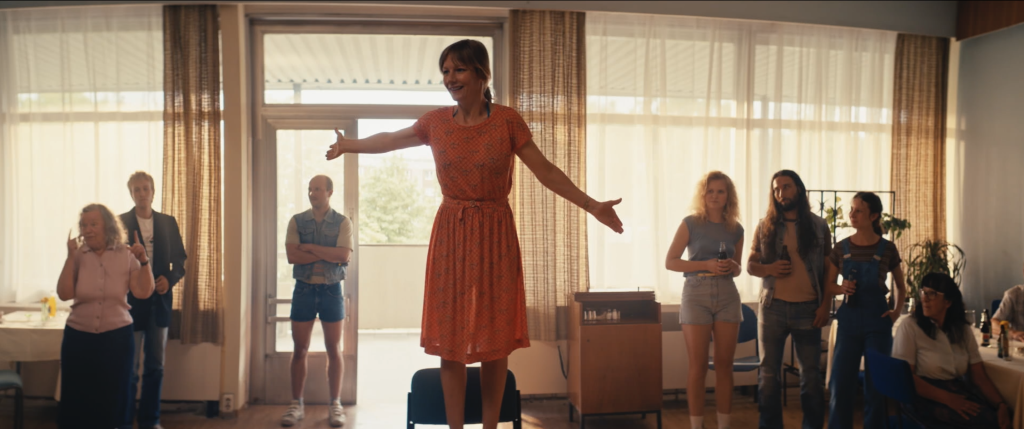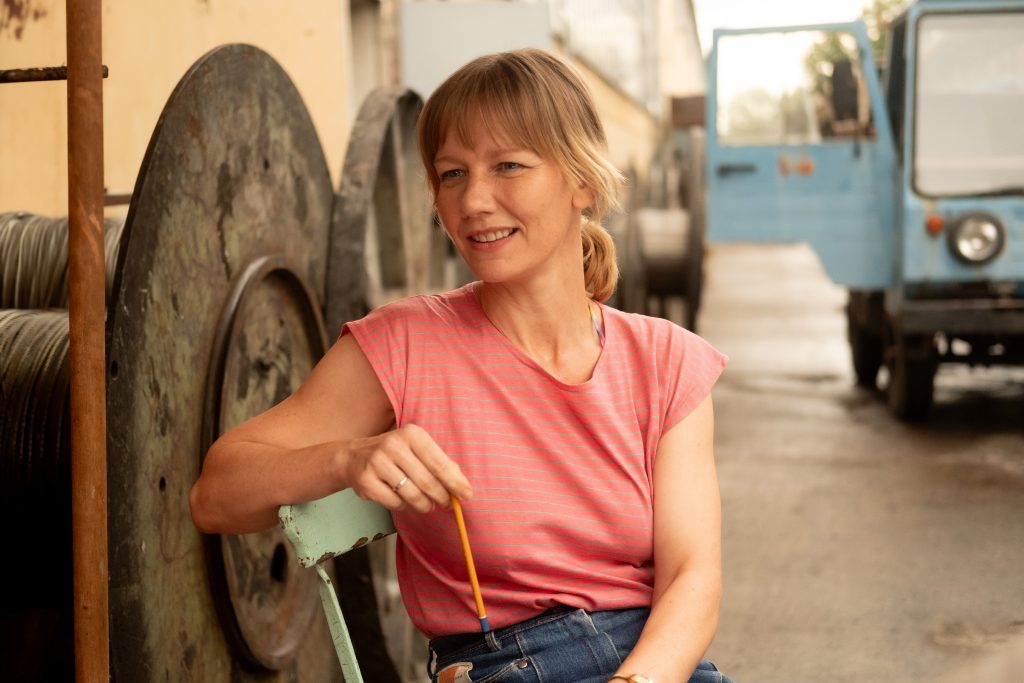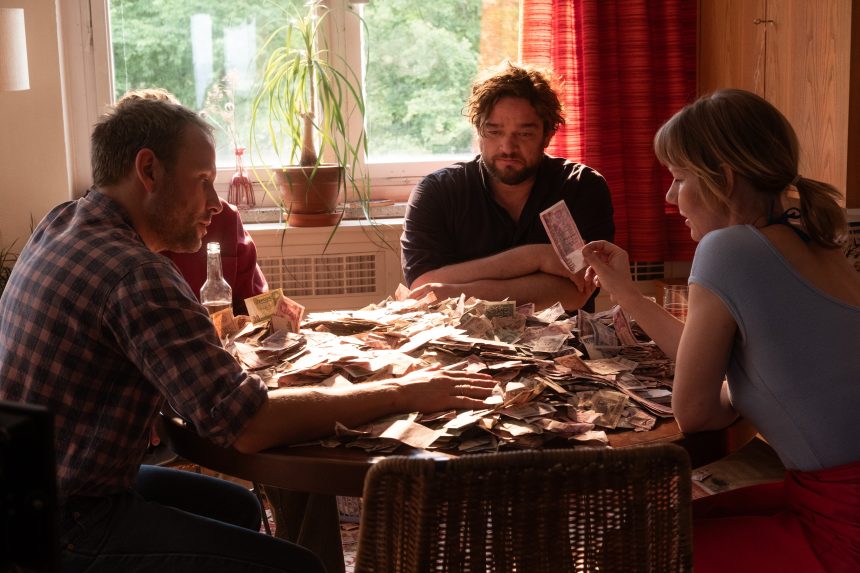A quote from Dostoevsky wraps up the final credits of this economic heist, written and directed by Natja Brunckhorst, and starring the Oscar- nominated Sandra Hüller. ‘Money is coined liberty’ nicely sums up the premise of the whole film, as well as the question about whether the reunification of Germany worked for everyone.
Based on a true story, the caper involves the residents of an apartment block in Halberstadt, East Germany, in the summer of 1990. It’s after the fall of the Berlin Wall, but before everything has been properly re-organised. East Germans knew they were unprepared for what was coming, as people started losing their jobs in droves, and an economic and social model which they had for decades believed to be the root of all evil, was suddenly the way they were supposed to live. So its with a great deal of rekindled hope for the future that Maren, played by Sandra Hüller, her husband Robert, played by Max Riemelt, and their childhood friend and her former lover Volker, played by Ronald Zehrfeld, find a enormous about of old money that’s being hidden in a bunker before its destroyed. More ingeniously, they find a way to convert the nearly defunct East German Ostmarks into shiny new Deutschmarks in the very final days that it is possible to do so. It’s amazing that this all actually happened.

Screening in the German Film Festival 2025
Selected for Chicago International Film Festival 2024, Munich Film Festival 2024.
Runner Up – Audience Award – Glasgow Film Festival 2025
Director and Written by Natja Brunckhorst
Cinematographer Martin Langer
Editor Ramin Sabeti
Producers Susanne Mann, Karsten Stöter, Paul Zischler, Martin Rehbock, Paul Zischler
Music Hannah Von Hübbenet and Amaury Laurent Bernier
Starring Sandra Hüller, Max Riemelt, Ronald Zehrfeld, Ursula Werner, Peter Kurth, Martin Brambach

Stylistically, it’s a joy to see the old socialist buildings and factories, and the thin-cotton 1990 summer clothes. Ostalgie is a real thing in Germany; nostalgia for East Germany, and it’s on the rise in a country that’s still struggling with its identity today. The film captures the positive side of that perfectly, and looks back with rose- tinted glasses on the people and place with a similarly styled colour palette. It’s also poignant to see how much trepidation there was of the incoming government, the changes described by one resident in the film as ‘not a re-unification, but a takeover.’ The police feign concern over the spray painting and graffiti admonishing citizens with ‘You wanted Kohl, now you’ve got him.’ The cops know they too will soon be out of a job.
There was also the mistrust at the time of anyone who jumped ship too early, who travelled as soon as the wall fell, as we see with the returning Volker, who has been adventuring in Hungary but says didn’t feel at home anywhere else but back in the old German Democratic Republic. Maren still has an emotional hold over Volker, and we watch him nearly run again at the first whiff of trouble, in juxtaposition to Maren’s husband Robert, who isn’t going anywhere. Maren between them plays out the role of a new country, torn between the old and the foreign, and wandering if she can have the best of both worlds.

What does unite everyone in the film is to do what they can to secure their future, and even better if it’s by taking advantage of Wessies, the residents of West Germany. They repeatedly sail through an old checkpoint that is the kind of place that used to be very dangerous, a dividing line that cut across Berlin, and was their part of the Iron Curtain. Suddenly no-one bats an eyelid at a camper van loaded up with kitchen appliances, as one passenger making the trip for the first time says, ‘This is just like flying.’
It feels like there might have been a funnier script somewhere, or some sharper jokes, that either didn’t make the cut in preference for something more easy- going, or was always pulled back from, maybe for fear that an international audience wouldn’t understand the context. It was one of the most fascinating times in history, that many art-lite cinema goers would no doubt have some memory of, or at least more than a passing understanding of. It’s somewhat charming and breezy, but it seems like a missed opportunity to make something very funny.

It’s interesting to reflect on how a whole population can be fed certain information, and by cutting off outside influence, or dissenting voices, the message can be swallowed whole, across generations. We’ve always seen that in places like Russia, and we’re increasingly seeing it elsewhere. In the film, we watch the East Germans struggling with the other end of the process, the dissembling of their political and personal identities, and it’s only one of the much older residents who points out she has done all this before, previously pivoting her thinking as the communist regime took hold.
There’s a poignant moment when a factory worker finds that the small metal bars he made were being exported in great numbers to Sweden. He believes they must therefore have been valuable or important, and we see how the workers believed they laboured in the pursuit of the greater good through communism, and quite literally to save the world. In West Berlin he discovers the same small bars in Ikea, and it dawns on the group that for decades they were in fact cheap labour for the West. It’s a hard pill to swallow.
In the end though, the community spirit doesn’t die, and we see a group work to help each other out, and we hope come out on top. Very few companies stayed in the hands of East Germans after reunification, but the ones that did, cleaned up. In the end the film drives the point home, wanting a bit of capitalism and co-operation at the same time, and that economic success, choice, and back to Dostoevsky – liberty, doesn’t mean that most people need to get shafted.
The German Film Festival will take place in Australia from 30 April – 28 May at Palace Cinemas, Palace Nova and Luna Palace Cinemas.










